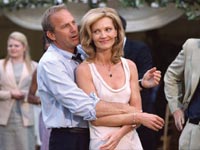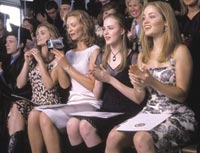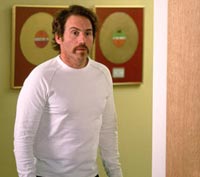There’s a scene in The Upside of Anger when Terry Wolfmeyer (Joan Allen) walks into her daughter’s bedroom to find Andy, the second of her four daughters, under the covers with Andy’s boss. The boss, “Shep,” is easily twice Andy’s age—and just happens to be this movie’s writer and director, Mike Binder. There isn’t any dialogue, per se, but the series of facial contortions and exasperated shrieks that follows and culminates in Terry storming out of the room leaves Andy (Erika Christensen) with no doubt as to her mother’s opinion on the situation. Andy slumps back on her pillow while Shep, in sleepy bewilderment, says something to effect of “Wow, that was intense.”
Indeed. Intense is a good way to describe Joan Allen’s performance in The Upside of Anger. Other words that come to mind are acerbic, witty, and perfect.

Kevin Costner is no slouch either, as Denny Davies, a boozy former baseball player turned radio talk show host who lives in the neighborhood and slides into the picture when he sees an opening left by the abrupt departure of Terry’s husband. In a career move reminiscent of Jack Nicholson in Terms of Endearment, Costner has reintroduced himself to the movie-going public as a flawed, but endearing and earnest soul.
Unfortunately, these two outstanding performances aren’t given much of a viable dramatic context. It sounds compelling and all the pieces seem to be there—a husband disappears, ostensibly with his Swedish secretary, leaving his beautiful family to work through the resulting emotions, namely anger, and pick up the proverbial pieces. The four daughters are played by a group of been-around-but-still-up-and-coming actresses—Alicia Witt, best known for her work on Cybil, plays the oldest, Hadley; Christensen, who broke hearts as a drug addled teen in Traffic, plays Andy; former Felicity namesake Keri Russell plays Emily; and Thirteen ingénue Evan Rachel Wood plays the youngest daughter, Popeye. It’s notable that Allen, at 48, is as attractive as any of these actresses, some of whom are half her age—or younger.

This movie tries to trade on the interpersonal dynamics of a house full of women, but perhaps a female screenwriter might have done so more successfully than Binder. As it is, there are a number of memorable lines and scenes with insightful dialogue, but they aren’t strung together with enough nuance to provide the promise of a rich emotional life below the surface. It’s true that would-be ballerina Emily deals with a serious bout of a stress-induced illness and Popeye is given some narrator duties that try to cast her in the wise child light, but none of the girls seems to really respond to the most traumatic events of plot. “Your dad has left you to go to Sweden with his secretary.” Wide eyes and downcast frowns. “Your drunken neighbor has taken up residence on your couch and is making a play for your mom.” Knowing smiles (with a token protest thrown in) and requests for an autograph. “There’s been no word from your dad for three years and your mom refuses to make the first move.” Pouts all around.
I can’t remember one scene in which any of the girls cried about the departure of her father. They seem more like good friends to Terry, outsiders who are sometimes sympathetic, sometimes condescending, but always present as she works through her anger issues, rather than daughters who have been rejected by their own father. They seem neither convincingly sad nor mad.

Nevertheless, Denny enjoys the company of these women and in the three-year span over which the film’s story takes place, he becomes a fixture at the dinner table (“I think you know my position on free food”) and in Terry’s bedroom. Their relationship, two difficult people who manage to make room for each other in their lives, is the most heartfelt aspect of the movie. With lesser performances, Terry would be too harsh and Denny too soft, but here they each seem to find just enough balance to keep their credibility. Without Allen and Costner, I suspect my 3-star rating would slip back closer to a 2.
A twist ending presented a lot of questions for me just as the movie was trying to tie things up with a nice little voice-over. Popeye says that the upside of anger is “the person you become”—that, ostensibly, anger can help you become a better person. It’s a premise worthy of discussion, but not one that I feel is really explored in this movie—especially in light of the twist ending. But the movie did resonate with the mostly middle-aged crowd I saw it with. They blessed it with a smattering of applause as the credits rolled. That might be because, for better and for worse, many in their 40s and 50s might see themselves in Terry and Denny—people struggling to reconcile their youthful dreams with the reality of what their lives have become. For some, it’s an easier reconciliation than for others. But just about everyone will be able to recognize the emotions expressed by Terry and Denny in this film.
Talk About It
Discussion starters- Given Terry’s situation at the beginning of the movie, is anger a justifiable response? Why or why not?
- Evaluate how the people in Terry’s life responded to her anger. Were those responses appropriate? Would you have done or said anything differently to her were you in the movie?
- How does the twist ending affect the overall message about anger communicated in the movie?
The Family Corner
For parents to considerThere are no real sex scenes in this R-rated film, but lots of unmarried people in bed together—or trying to get in bed together. Alcohol and pot consumption are ubiquitous, as is foul language. Bottom line: don’t take the kids.
Photos © Copyright New Line Features
What Other Critics Are Saying
from Film Forum, 03/24/05Writer/director/actor Mike Binder turns in one of 2005’s most critically acclaimed films so far with The Upside of Anger, and the reviews hail Joan Allen’s performance as one of her very best. Allen, most recently seen in The Bourne Supremacy, has been nominated several times for an Oscar, but has yet to win. It’s possible she’ll earn yet another nomination for her work as Terry, a disillusioned, middle-aged woman who falls in love with Denny, a retired baseball star (Kevin Costner) next door. The film also stars Erika Christensen (Traffic), Keri Russell (TV’s Felicity), and Evan Rachel Wood (Thirteen, The Missing).
Binder’s film is extremely popular with the mainstream press, and religious press critics are finding plenty to praise as well.
“Without Allen and Costner, I suspect my 3-star rating would slip back closer to a 2,” says Lisa Ann Cockrel (Christianity Today Movies). “A twist ending presented a lot of questions for me. . . . But the movie did resonate with the mostly middle-aged crowd I saw it with. That might be because, for better and for worse, many in their 40s and 50s might see themselves in Terry and Denny—people struggling to reconcile their youthful dreams with the reality of what their lives have become.”
Megan Basham, a Christian film critic who writes for National Review, says Upside “is a story too rare in cinema today: It’s a love story for and about grown-ups—people who carry life’s scars into their next relationships and cope with disappointment in messy ways.” She too has some problems with the way the film wraps up, but concludes that it’s “truly something special.”
Harry Forbes (Catholic News Service) says it’s “a beautifully acted, droll, and, ultimately, profoundly moving comedy-drama. [It] imparts a strong moral about the destructive nature of misplaced animosity … and ultimately is a touchingly strong affirmation of love and family. And it’s intelligent adult fare, as too few films are these days, even if there is a preponderance of salty language.” He says Joan Allen “surpasses anything she has ever done with a mercurial performance that is a pleasure to watch.”
Michael Elliott (Movie Parables) joins in with raves for Allen, saying her “intensity simply burns up the screen.” He praises Costner and the rest of the cast, but has a few notes for the director. “Binder has written some very clever dialogue and crafted some interesting characters but his screenplay is far from flawless.”
Cliff Vaughn (Ethics Daily) considers how the film stacks up to a similar drama. “Anger doesn’t match the overall cohesiveness of American Beauty. . . . But the performances by Costner and Allen are rock-solid, and the relationship they build is one many mature adults will be able to appreciate.”
from Film Forum, 03/31/05Andrew Coffin (World) says it’s “a sad, often biting look at a family in the grip of anger. The film wants us to believe that however horribly its characters act, in the end things will turn out OK through some magical act of catharsis.”
Copyright © 2005 Christianity Today. Click for reprint information.











